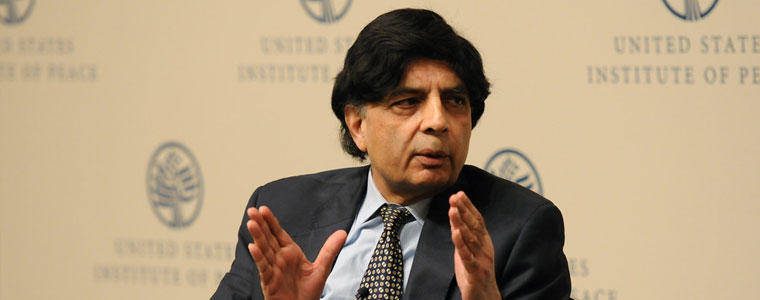The Pakistani Taliban’s killing of more than 150 people at the Army Public School in Peshawar in December spurred the Pakistani government to draft a new National Action Plan against terrorism. A primary architect of that plan, Interior Minister Chaudhry Nisar Ali Khan, discussed his country’s terrorism challenge on Feb. 18 in his first public appearance in Washington since taking office in 2013.

While Pakistan has been subject to numerous extremist attacks for more than a decade, the school attack was singular in the shock it generated in the country, with 134 children among the victims.
“For the first time, an environment has been created in which the government is moving forward on a very, very fast track” to strike against the Taliban and allied groups, Khan said.
“Historically, there has been a divide … over the last 10 or 12 years between the civil and military [authorities] on how this operation against terrorism should move forward,” he told an audience of policy specialists and officials.
In 2013 to 2014, Khan said, the government of Prime Minister Nawaz Sharif first gathered a consensus among political parties to attempt dialogue with the Taliban, an effort the administration broke off after Taliban-allied guerrillas attacked the country’s largest airport in Karachi, in June 2014. The fact that peacemaking had been attempted first enabled the government to rally the support of “all the political parties” now behind a military offensive against the Taliban, he said.
“An environment has been created in which the government is moving forward on a very, very fast track.”
The government’s policies, culminating in the new National Action Plan, mark the first time that civilian and military authorities in Pakistan have forged a joint strategy against extremism, Khan told the USIP’s South Asia director, Moeed Yusuf, who moderated a discussion with the audience. “You come from Pakistan,” he told Yusuf. “You know we normally … act first and strategize later. We have been engaged in this war against extremism for the last 13 years. We had no strategy; almost everything was being handled by the military, and a lot of it was off the cuff.”
“When this government took office in June 2013, one of the first imperatives … was to have a strategy, was to have a policy,” he said. In creating its action plan, the Sharif government coordinated significantly with the military for the first time, and also engaged Pakistan’s provincial governments, which control most police work in the country, Khan said.
Dozens of intelligence agencies
Pakistan critically needs better coordination among the disparate organs—federal and provincial, civilian and military—that conduct security work, he said. “Pakistanis were jolted by this revelation that we have … 33 intelligence agencies working in Pakistan,” Khan said.
“Most of these agencies were working in competition with each other, sometimes at variance with each other,” he said. “I can say now that there has been a sea change. … There is a lot of close coordination.”
USIP has worked in Pakistan since 2005 to promote peace and stability. The institute conducts research and programs to counter violent extremism, strengthen youth and civil society organizations, and improve relations between police and their communities.
To a question by Yusuf about the continued operation in Pakistan of banned extremist groups, which often have evaded formal bans simply by changing their names, Khan said, “I’m almost embarrassed to give you feedback on this,” saying that, when his government took office “there was no tangible record on the exact number of proscribed organizations.” And official prohibitions on militant groups have been enforced selectively, Khan conceded.
“Giving a free hand to most of these groups over the years has given rise to a lot of problems,” he said.
Now, Khan said, there is “a consensus that … no armed militias should be allowed in Pakistan, and only official security agencies should be allowed to carry arms. That is a policy which is being implemented.”
Yusuf pressed Khan on Pakistan’s past practice of permitting the operation of militant groups that have focused their attacks on India or Afghanistan. Those governments, and independent analysts, have accused Pakistani military and intelligence officials of protecting groups such as Lashkar-i-Taiba, which has attacked Indians in Kashmir, Mumbai and elsewhere, and the network of Afghan militant leader Jalaluddin Haqqani.
Khan responded: “I can speak about the intent of the Pakistani state as of today. I cannot speak about the intent of the Pakistani state or various Pakistani governments over the years. But more importantly, the international community had understood the point of view, in this respect, of successive Pakistani governments. So why blame us at this stage in time, when I think the intent in this respect is very, very clear.”
“Our point of view is that it will take a bit of time. Things have reached such a pass that you cannot expect overnight solutions,” Khan said. “The intent is there, which was never there before. And actions have been taken over the last few weeks which are a manifestation of that intent.”